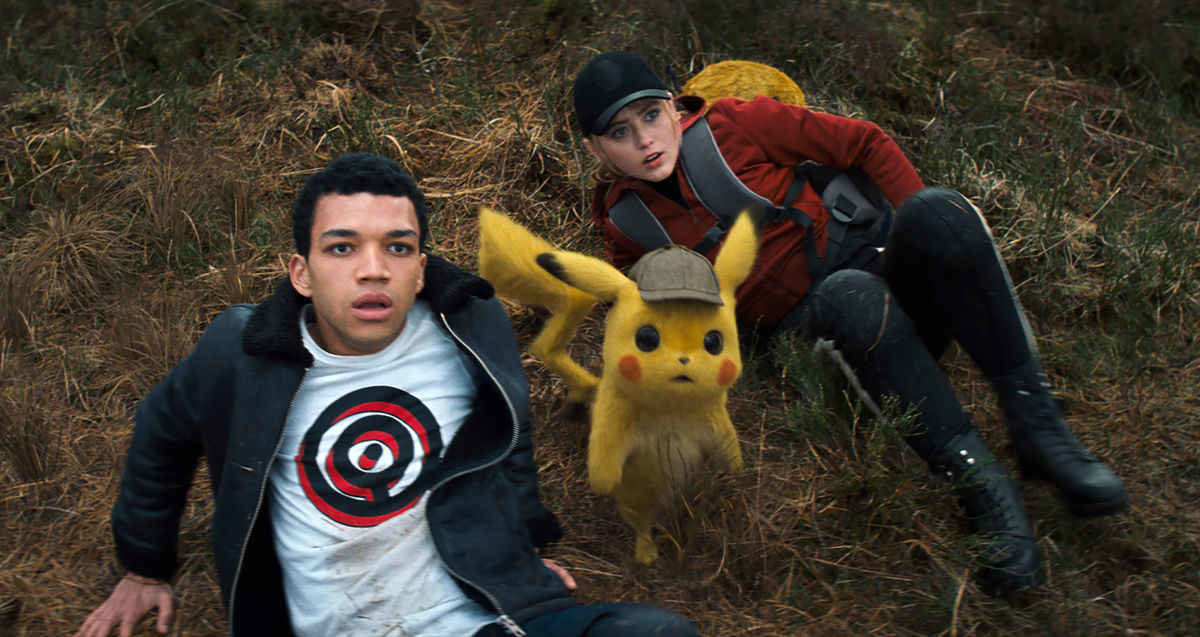

Loosely based upon a spin-off video game of the same name, Pokémon Detective Pikachu is the first live-action installment in the multi-billion-dollar Pokémon franchise.
Expanding over the last 25 years from video and card games to toys, television, and extensive merchandising, Pokémon continues to enjoy periodic resurges in popularity amongst fans across the world.
In the present case, although it might not be strictly necessary to be a poké fanatic for one to thoroughly engage the film, it might be necessary for one to thoroughly enjoy it.
The film introduces a novel, even eccentric spin on the classic poké setup.
Whereas traditional poké fare depicts animated preteens hunting, collecting, and then competing with a variegated array of battle-ready “pocket monsters” – the franchise originated as a series of Nintendo Game Boy games in the mid-1990s – Detective Pikachu has humans and Pokémon living side by side in a fictional Rhyme City reminiscent of a gently futuristic London-slash-Tokyo.
Surprisingly light on poké battles, the film banks heavily upon the ooh and ahh factor of CGI-cameos by creatures that are doubtless old favourites of diehard fans – hey look, is that Blastoise? Did you spot Charmander? What’s the name of that one again? – as well as upon the cuteness factor of lingering conversations with a cuddly, plush Pikachu.
In fact, the film feels rather like Pikachu appears: fluffy, a little overstuffed, with faint homages to something with an edge.
The titular Pokémon wears a Sherlock Holmes sleuth hat, for instance, that tips its brim to some of the darker motifs of noir detective fiction.
Whereas lead characters in that genre are customarily found scraping the bottom of society, circling an existential drain whilst hard-drinking themselves towards the grave, here these themes are softened and divided between the lead duo: a 21-year-old with regrets – he never spent enough time with his father – and his poké partner who guides them through a steaming yet relatively shadowless underworld while exuberantly indulging in that most smiled-upon of abused substances, coffee.
The story follows their attempt to uncover the truth behind the alleged murder of the boy’s detective father, in addition to whatever links there may be to Pikachu’s unaccountable amnesia.
Along the way the film provides a lighthearted romp through a digitally revamped pokéverse, accentuated by largescale action sequences and featherweight badinage by Ryan Reynolds (the voice of Pikachu).
While the story itself is lacklustre, for some this might be compensated by the sheer delight of reencountering childhood fun in a sparkling up-to-date bigscreen format.
Most, though, will probably walk away with the feeling of having watched a fresh ray of sunlight shine through the window of someone else’s childhood.
Indeed, with a story too simple for adults and a sprinkling of profanities unsuited to children, it is not instantly obvious what audience the film is intended for.
Yet judging by the enthusiastic remarks of the handful of other moviegoers who lingered through the credits for any bonus footage (there isn’t any), what the film lacked in itself seemed to be made up for by what they brought to it – nostalgia. This would seem to be a key ingredient to enjoying the film, and if one hasn’t caught it already, is unlikely to catch at all, at least as far as the present offering is concerned.
This leads me to conclude that the primary intended audience is that relatively rare specimen amongst humanity – if somewhat less rare, perhaps, amongst the regular attendees of the cinema – namely, that inner child who happens, somewhat surprisingly, to find him or herself grown up into the outward bodily trappings of the adult.
And perhaps the rarity of this situation is so much more the pity. Who would not like, at least on occasion, to return to that primitive sensibility in which a mere flock of funny-looking pigeons arouses wonder, or a fuzzy little creature appears endlessly fascinating?
For better or worse, however, this is not the case for most persons most of the time, who will probably want a bit more from these monsters sprung from pockets, in return for the cash they shell out of theirs.
(Originally published in The B.C. Catholic)
